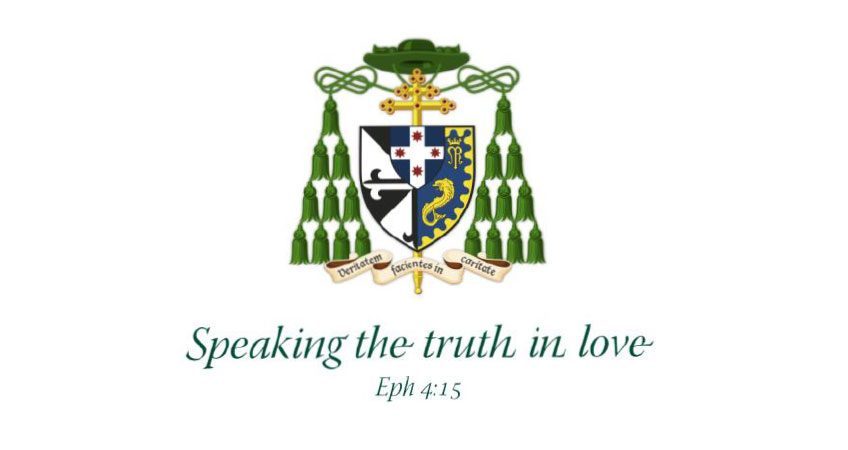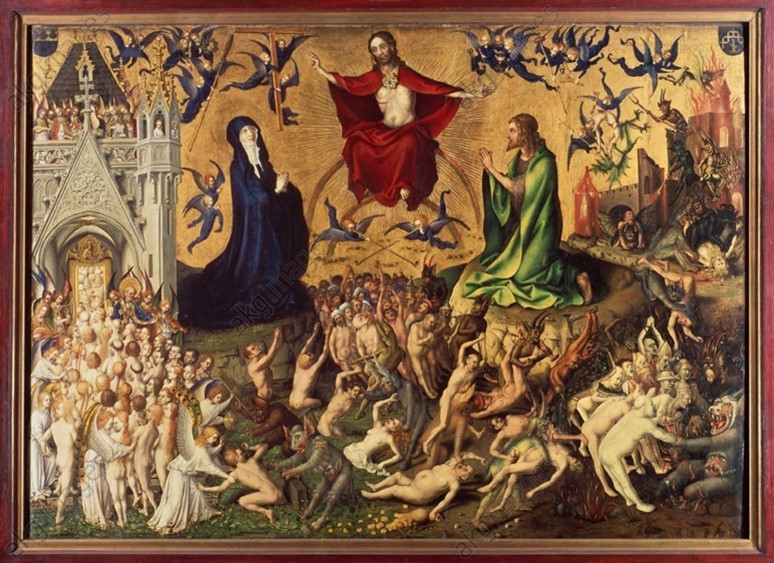HOMILY FOR MASS FOR 1ST SUNDAY OF ADVENT C – INVESTITURE OF KNIGHTS OF THE HOLY SEPULCHRE

St. Mary’s Cathedral Basilica, Sydney, 28 November 2021
Integrity commissions are all the rage. The states have them and the Commonwealth will too—eventually. Such agencies attempt to root out abuses of office, perversions of justice and other corrupt conduct in public administration. Their investigations have brought down premiers and other public officials. Meanwhile many professional and sporting associations, universities, corporations and charities have mirrored these integrity commissions with codes of conduct and complaints processes to ensure management and staff conduct their activities ethically.
“See, the days are coming, says the Lord, when I will make a virtuous bud spring forth from David’s line, who shall practise honesty and integrity in the land” (Jer 33:14-16). Our word integrity comes from the Latin ‘integer’ meaning whole or complete and refers first to the harmony between a person’s thoughts, emotions and choices; to their steadfast commitment to principles and persons, institutions and causes, traditions or projects; and finally to consistency between their virtues, principles and actions. Our Psalmist pithily captures this when he prays “Lord, make me know your ways, let me walk in your truth” (Ps 24).
So the Scriptures praise the man of upright heart, who shuns evil and seeks good, who desires not worthless things but trusts in the Lord, who keeps the commandments, is honest and just.[1] We think of heroes like Abraham,[2] Job,[3] Esther and the righteous whose praises are sung in the Psalms,[4] or the martyrs who’d rather die than play false to their beliefs.[5] We think of Joseph ‘the just man’ (Mt 1:19), husband of Mary, who would school in virtue that greatest branch of David, the boy Jesus. And we think of that boy full-grown, of whom even His enemies said: “Teacher, we know you are a man of integrity and teach the way of God truthfully, not seeking anyone’s approval but treating everyone impartially”.[6] So Paul told his young protégé Timothy that he must demonstrate “a pure heart, a good conscience and a sincere faith” and told his other disciple Titus to be “in all respects a model of good works, so everything you do reflects the integrity and seriousness of your teaching.”[7] As if we too were his protégés, Paul speaks to us: “May you be blameless in the sight of God,” and “make more and more progress in the kind of life you are meant to live” (1Thess 3:12-4:2).
No Time to Die (2021) is the 25th movie in the James Bond franchise and the fifth and last time Daniel Craig plays the lead. A traumatised Bond comes out of retirement for one last mission and seems bruised, reflective, emotional. He tells us “History isn’t kind to those who play God.” Which would have pleased Bond’s inventor, Ian Fleming, who was a Scots Calvinist and included many biblical references in the novels.[8] Kingsley Amis identified a “fairly orthodox morality” underlying the Bond adventures that takes for granted that some things are good—“loyalty, fortitude, a sense of responsibility,” self-sacrifice, integrity—and some things are bad—“tyranny, readiness to inflict pain on the weak or helpless, the unscrupulous pursuit of money or power.”[9]
This time around Bond says “Life is all about leaving something behind.” His archenemy Lyutsifer Safin—a play on the words ‘Lucifer Satan’—intends to unleash a biological weapon on the world so that he will leave literally nothing behind. Bond, by contrast, wants to save his beloved Madeleine, her daughter Mathilde (who just might be his), and of course the world. But integrity, as the Man who really did save the world demonstrates, can cost you your life…
Chapter 21 of Luke’s Gospel is full of end of the world talk (Lk 21:25-36). The signs are rather like the bushfires, floods and plague of the past two years—apocalyptic signs marking the end, if not for the whole world then at least to some of those in it. Such signs disrupt our sense of security and complacency, forcing us to face up to our mortality and moving us to think about the big questions with some urgency. A recent study found that 45% of Australians drew on spiritual practices to get through the pandemic, and 15% rather more than usual.[10] Another study reported that a third of Australians have thought more about God under COVID, more than a quarter are praying more, and half have thought more about the meaning of life and/or their own mortality.[11] Only last month the Roy Morgan poll found Australians are now more likely regularly to attend a place of worship than they were prior to COVID.[12] And another study found them now more willing to have a spiritual conversation.[13]
Thus instead of shrugging off the heavenly signs as natural disasters or cruel fate, we can respond to crisis by turning to the spiritual. It is the Advent instinct. After all, no-one knows the day and the hour of death and judgment for themselves or the world; but fire and plague underline our vulnerability and mortality. We wonder when and what comes after.

The Last Judgment by Stephan Lochner c. 1440, Wallraf-Richartz-Museum Cologne
So what’s it to be as we face our end: alarm or confidence, anxiety or excitement? Advent is a season of expectancy, when the Virgin is with Child and all creation waits with eager longing like a woman in travail (Rom 8:19-23), at the end of which comes delivery. Advent is a season of expectancy in a second sense, as we look towards eternity and another kind of deliverance: from sin, suffering and even death, from the fragility exposed by COVID and the licentiousness critiqued in the Gospel. Advent calls us to a certain asceticism not as a penance so much as a sign of our coming liberation.
To watch and wait for our deliverance might seem rather passive. But the Prophet Jeremiah, Our Lord Jesus and the Apostle Paul were not passive: like the patriarchs, prophets and martyrs, like 007, like those being invested today as knights of the Holy Sepulchre, they were people of action, whose deeds, combat, even death demonstrated their virtue. So Jesus calls us today to vigilance: “Stay awake, praying at all times for the courage to endure”. But He also calls us to integrity: “Watch yourselves, or your hearts may be coarsened by drunkenness, debauchery and depression”. How are the two connected? By living a Christian life we don’t just wait for God’s kingdom to come, we co-operate in making it come, in our hearts, homes, world.
Advent Christians live the future in the here and now. We accept our responsibility with regard to our times and invest each moment with its full weight of eternity. We are charged with rousing a slumbering world, losing its will through complacency, its mind through idols like consumerism, its heart through “drunkenness and debauchery” and 101 more sophisticated self-indulgences. As Christians “make more and more progress in the Christian life” they become signs more powerful of the coming kingdom than any eclipse or volcano. The end is nigh and the judgment of the heavenly integrity commission is coming: prepare yourselves, Jesus says, so you can “hold your heads high” and “stand with the Son of Man”!
WORD OF THANKS AFTER THE KNIGHT’S PRAYER AFTER COMMUNION
St. Mary’s Cathedral Basilica, Sydney, 28 November 2021
My congratulations to those invested in the Order of the Holy Sepulchre today and my thanks for all they do year round to assist the Church in the Land of our Saviour’s first Advent.
We cry out to Him at this time: Come, O come, Emmanuel; come into the crib of our hearts, the manger of our souls. And so immediately after Mass today we will have the blessing of the crib in the Cathedral Square and you are most welcome to join us.
[1] Gen 20:5-6; 1Kings 9:4; Sir 7:6; Mal 2:6.
[2] Gen 18:19; 1Macc 2:52; Rom 4:3-13; Heb 7:2; Jas 2:23.
[3] Job 2:3,9; 27:5; 31:6.
[4] Ps 7:8; 24:4; 25:21; 26:1,11; 41:12; 10:2,9; 11:3; 14:32; 17:26; 19:1; 20:7; 24:4; 28:6,18.
[5] 2Macc 6:18-7:42.
[6] Mt 22:16; cf. Mk 12:14; Lk 20:21; Jn 1:14,17; 8:45-46; 14:6; 17:8,17-19; 18:37.
[7] 1Tim 1:5; Tit 2:6-8; cf. Acts 26:25; Rom 9:1; 1Cor 5:8; 2Cor 4:2; 6:7; 12:6; Gal 2:5,14; Eph 4:15-25; 6:14; 1Tim 3:15; 2Tim 2:15.
[8] John Pearson, The Life of Ian Fleming (1966).
[9] Kingsley Amis, The James Bond Dossier (1965).
[10] Dr Ruth Powell reported in Jewel Topsfield, “The search for belonging: Is COVID making us turn to religion?” The Age 16 July 2021.
[11] McCrindle Research, Australia’s Changing Spiritual Climate (McCrindle/City Infield, October 2021); McCrindle Research, The Future of the Church in Australia (McCrindle, 2020), pp. 15f; John Sandeman, “One in three Australians are thinking more about God as a result of the pandemic,” Eternity 22 October 2021; Anna Patty, “The meaning of life: Australians praying more during COVID-19,” Sydney Morning Herald 23 August 2020; Kim Wilkinson, “Pandemic Causing an increase in spiritual openness amongst Australians,” Rhema 99.7 https://rhemafm.com.au/pandemic-causing-an-increase-in-spiritual-openness-amongst-australians/.
[12] Roy Morgan Polls, “COVID-19 pandemic leads to more Australians regularly attending their place of worship: Research finding No. 8824,” Roy Morgan 18 October 2021.
[13] Rebecca Abbott, “Aussies more open to spiritual conversations through COVID,” Eternity 1 April 2021 https://www.eternitynews.com.au/australia/aussies-more-open-to-spiritual-conversations-through-covid/amp/
Welcome to St Mary’s Cathedral in Sydney for the Solemn Mass of the First Sunday of Advent and the beginning of the new liturgical year. Advent is a time when we look forward to the coming of the Christ-Child at Christmas, His return as King at the end of days, and that third advent in between when we encounter Christ in this life and meet Him face to face in the next.
Last Thursday the lower house of the New South Wales Parliament voted by 52 to 32 to legalise euthanasia and assisted suicide. Even the most minimal protections and sensible amendments were resisted. If this Bill becomes law it will be a catastrophe for law and medicine and a defeat for humanity. We must now work with the members of the Legislative Council to defeat it and, if we cannot, to improve it. We pray today that the terminally ill, frail elderly and handicapped people continue to be respected, to have the full protection of our laws and to be guaranteed the best of palliative care and other positive support.
There was a little light this week with the introduction of the Religious Discrimination Bill into the Federal Parliament. We pray that people’s right to believe and practice their faith and not to be discriminated against will at last be recognised in our laws alongside other positive rights and discrimination protections.
Today we celebrate the Investiture of some Knights of the Equestrian Order of the Holy Sepulchre of Jerusalem, including two of the parliamentarians who stood up for terminally ill, frail elderly and handicapped in parliament this week, opposing the Kill Bill and giving, I must say, excellent testimony to faith and values. The Order they now join is charged by the Church with providing for the needs of the Latin Patriarchate of Jerusalem, and for many of the works of the Church in the Holy Land. It contributes to the support of 68 parishes, 40 primary schools, 33 secondary schools, a university and several hospitals, dispensaries and welfare centres. I welcome the several chaplains of the Order present today, the Lieutenant Mr Justice Kunc and other leaders.
Starting last Tuesday night and continuing for a fortnight or so, we will have eight ordinations in the Archdiocese of Sydney: five deacons, two priests and a new auxiliary bishop. Bishop Danny Meagher will be ordained here on 8 December at 7pm. Please pray for all eight men. To everyone present on this happy New (Liturgical) Year’s Day, especially the Knights and Dames of the Order, a very warm welcome!

